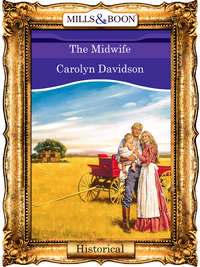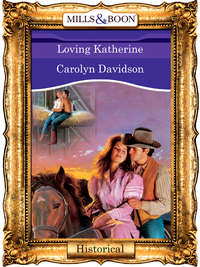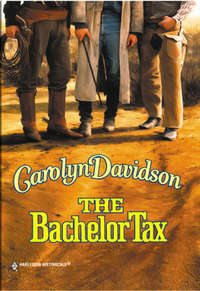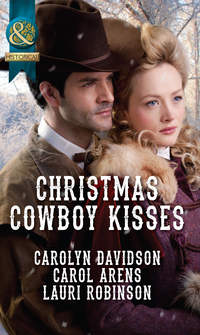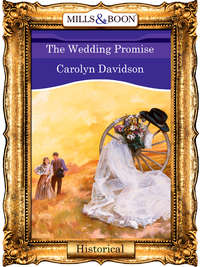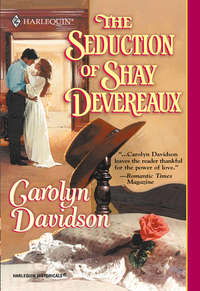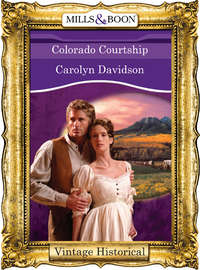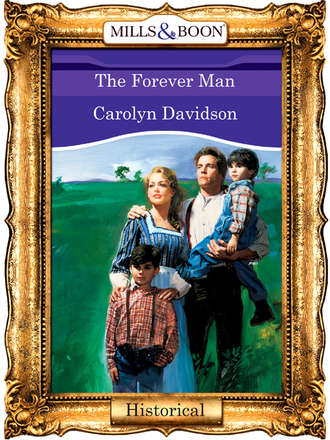
Полная версия
The Forever Man
And then she drew in a deep breath as she recognized that her decision had already been made. She would marry Tate Montgomery. She would take on his children as her own. She would be Mrs. Montgomery, a wife in name, at least. If he asked no more from her than that, she would never have to own up to the shame she carried as a great weight on her conscience. The shame of a fallen woman. A Jezebel, Pa had said.
“I’d see the letters you brought with you, Mr. Montgomery,” she said, scooping a generous helping of chicken and vegetables onto his plate. She ladled a spoonful of steaming gravy over it all, then carefully placed the next piece of crusty topping over it and handed him his plate. She’d taken the first spoonful for herself, then served him, so that his crust would be unbroken and appetizing. It was a small gesture, one she’d seen her mother repeat often.
A man was the head of the house, given the best piece of meat, the freshest bread. His coffee was poured first, his shirts ironed when the sadirons were cooled just enough not to scorch. Pa had expected it, the honor accorded him as a man.
Tate Montgomery, on the other hand, looked a bit amazed at the attention he’d been given by his hostess. She’d placed the fresh round of butter in front of his place, piled newly sliced bread on a plate and edged it with a jar of strawberry jam and a comb of honey. His cup was brimming with hot coffee as he sat and nodded his thanks with a raised eyebrow and a half smile signifying his surprise.
Timothy and Pete sat at the sides of the table, the three forming a setting she could not help but appreciate. They looked like a family, the four of them around the table, the kerosene lamp above, its glow circling them with a suggestion of warmth. The boys stretched their plates toward her, and she helped them to the food before taking up her napkin to spread across her lap.
Timothy watched her carefully, then removed his own napkin to follow her example. She caught his eye as he glanced at her again, and smiled her approval. His small, perfect teeth flashed for a moment between his lips as he allowed a crooked grin to touch his mouth. Then he ducked his head and tended to the business at hand.
“I’ll bring you the letters after supper,” Tate Montgomery offered as he swallowed his first bite of potpie. “You cook a fine meal, Miss Johanna,” he said, as if compliments came easily to his lips. It was the second one he’d given her, and both in the space of a day. He was a gentleman, she decided. The fine woolen trousers had given way to farmer’s overalls, and the coat he’d worn earlier had been replaced by a heavy flannel shirt, but he ate with clean hands and good table manners.
“Can I have jam on my bread, Pa?” Pete had made away with over half his dinner already. She’d been right. The boys had been more than hungry. She’d have to be sure to offer them apples in the afternoon from now on. Or maybe…Her mind swirled with thoughts of tending to three male creatures, the work implicit in their well-being, the extra washing to do, the meals to cook.
And where would they sleep? Once she married their father, the boys would move into the house, perhaps share her old bedroom with its big double bed and hand-hewn dresser.
Where would she sleep then? In the attic? In her mother’s sewing room? Surely not in the big bedroom at the top of the stairs, where her parents had conducted a marriage for almost twenty years. That would be Tate Montgomery’s room. He deserved it, as the head of the family.
“I said, I wouldn’t mind another helping of that chicken pie, if you don’t mind, Miss Johanna.” His voice was quiet, sounding amused at her expense, as if he knew he’d caught her daydreaming. If such a thing could be, with night coming on. She’d done her share during daylight hours, that was for sure. But usually by this time of the day she was too tired to think of much else than setting the kitchen to rights and heading for her bed.
She spooned up another portion on his plate, and he murmured his thanks. His hands were deft as he spread jam on another slice of bread and handed it to Pete, then did the same for Timothy. He was used to looking out for them, she thought idly. It showed in his manner, in the way he watched them, unobtrusively but with vigilance, noting their behavior, nodding his head with approval or shaking it slightly as Timothy stuffed his mouth in his eagerness to eat the jam-laden bread.
“I’m glad your boys are good eaters,” she said. “Will they like oatmeal for breakfast? Or would sausage and eggs be better?” Folding her napkin beside her plate, she lifted her glass to drink from its foaming depths. The milk was cool, fresh from this morning’s milking. “Would you like more milk, Pete?” she asked, setting her glass on the table.
A glance at his father gained him permission, and Pete nodded his answer. He swallowed quickly and supported his unspoken request with a “Yes, ma’am.”
Johanna rose from the table and lifted the pitcher from the cupboard, filling both boys’ glasses, Timothy’s not quite to the brim, in deference to his youth and his smaller hands.
“I’d take a small tumbler of that milk, if you don’t mind,” their father said as she straightened from her task.
“Would you rather not have coffee? I assumed…My father always liked coffee with his supper.” She reached for another heavy glass from the shelf behind her and poured it full, placing it next to his plate as she spoke.
“I enjoy both sometimes. Coffee always, especially at breakfast. As for early morning, we take whatever’s available. Oatmeal and the rest will do fine.” he assured her. His gaze followed her as she moved across the kitchen. “Sit down, Miss Johanna. We need to speak for a few minutes.”
She complied, bringing with her a bowl of cookies she’d taken from the crock where she kept them for freshness’ sake. The boy’s eyes brightened as they tilted their chins to better see within the dish, and Timothy was hasty in his movements as he finished up the last of his supper. He licked a stray crumb of crust from his upper lip and edged his hand across the table to where the bowl sat.
“Ask first, son.” Though quietly spoken, it was a rebuke nonetheless, and the child nodded.
“Please, ma’am, may I?” he whispered, his dark gaze fixed on her face.
“You may have one of each, if your father says so,” she offered, sensing his indecision.
His smile flashing, the child accepted her offer.
“Ma’am?” the older boy asked, his question implicit
She tipped the bowl in the other direction, and the boy reached in.
Tate shoved his chair back from the table and stood. “I believe I’ll make a trip to the barn, Miss Johanna. You boys can eat your cookies and then get on outside. Stay away from the back of the barn, like I told you.”
They nodded simultaneously, their mouths full, Timmy’s feet swinging beneath the table. Johanna felt the brush of his small boots against her skirt as he kept time to an unheard beat. It was a foolishly comforting touch, and she sat unmoving until he’d eaten every last crumb of his cookies and drunk the last drop of milk.
“Go along now, boys,” she told them, gathering the plates and flatware. Intuitively she left the cup in front of Tate Montgomery’s place. He’d not had any dessert yet. He might want more coffee to go with it.
Her hands were plunged in the dishwater when she heard him come back in the door. A quick glance over her shoulder proved her right. He’d taken the coffeepot to the table and filled his cup. At his right hand was an envelope, fat with folded papers. He gestured at it as she watched.
“Here are the letters of recommendation I spoke of. You’ll find two from ministers in the town we lived in, and one from my banker, the owner of the general store, and my doctor.”
She flushed, embarrassed for a moment as she anticipated reading personal things about this man. Surely she had the right to know all she could about him, but the thought of learning it in this way was almost like…maybe windowpeeping, or reading another person’s mail.
Drying her hands on the towel, she walked back to the table and sat across from him once more, then reached for the envelope.
“Go ahead,” he told her. “It won’t take you long. It’s just information you’d expect to get from a doctor or banker. You’ll find that I’m healthy and fit, I’ve got a decent bank account, and I paid my debts at the general store on time and in full. My minister even noted the amount I gave toward the building fund for the new church last year.” His mouth was twisted wryly as he watched her, and she recognized his own slight embarrassment as he made light of the letters written in his behalf.
She held the envelope in her hand, squeezing the bulk of it and watching him closely. His eyes were dark, but not brown, as she’d thought at first. They were a deep, deep gray, with just a few blue flecks around the edges of the pupils. Sometimes they were flat, hard-looking, like when he’d gone to talk to the boys about the dog, earlier today. Now they were softer, more vulnerable, as if he were hesitant to lay his life out before her, all stuffed in a envelope and waiting for her perusal.
“I’d like to know a couple of things, Mr. Montgomery.” She squeezed the papers, hearing the faint crackling of the crisp envelope.
“Do you think you could call me Tate after we’re married?” he asked quietly. “In fact, maybe you could start now.”
She bit against her top lip. “It’s unseemly for me to use your given name.”
“Try.” His eyes entreated her, and she looked away, settling her gaze on his folded hands instead. They were good hands. Strong and well formed, clean, with a tracing of soft curls across the back. She’d warrant his forearms were covered with the same brown hair. Her eyes closed as she recognized the drift of her thoughts. What was covered by his shirtsleeves was none of her business.
“Try, Miss Johanna,” he repeated, and she sighed, aware that he wasn’t about to give in on this matter.
“All right. I want to know how long your wife’s been dead, Tate.”
“A year and a half. She drowned in a spring flood.”
It was more than she’d asked, and somehow the thought of the unknown woman being swept away by rushing waters made her want to cry. She gritted her teeth against the feeling and looked up at him. “It must have hard on your boys, losing their mother that way.”
“They’d been staying with her sister for a few days when it happened. Didn’t seem to cause much of a fuss over it, to tell the truth. But then, they were close to Bessie. That was her sister’s name, and she kept them for another week after it happened.”
Johanna felt a hollow spot in her middle expand and grow chill with his words. “Why were they with their aunt? Didn’t their mother want them home with her?”
He unfolded his hands, and her eyes were drawn to the movement. He’d formed them into two fists, and his knuckles were whitened, so hard had he curled his fingers into his palms. “My wife hadn’t been herself, hadn’t been feeling well.”
“She was sickly?”
He shook his head, and his gaze bored into her, impelling her eyes to sweep up the length of his chest, up his throat and chin, over his flared nostrils, and jam smack against the hard, cold look he offered her. “She had problems. She was unhappy with her life, and sometimes the boys bore the brunt of it Her sister…well, her sister understood, and when things got touchy, she’d come and get Pete and Timmy and take them home with her.”
“Was she mental?”
His mouth thinned, his teeth gritting together, and he moved his hands to the edge of the table, shoving his chair back and rising swiftly to his feet. “Do we need to discuss this now? I’d think it was sufficient for you to know that she wasn’t herself sometimes.”
Johanna shook her head. “No, I guess we don’t have to talk about it any more. I just wondered…”
“I’m sorry, ma’am. I didn’t mean to be rude. It’s just not my favorite memory. It happened, and it changed our lives. My boys need a mother. To tell the truth, I decided when I first laid eyes on you that you were strong and had a clear mind and your eyes were honest and kind. And that’s what I was looking for for my boys.”
“You knew all that by seeing me out there by your wagon?”
He nodded. “I knew all that when I saw you come hotfootin’ it across the field between here and your orchard. Any woman who planned on hauling all those apples to the house had to be strong. A woman who’s been able to keep this place going obviously has a clear mind. And you’ve got the bluest, sharpest eyes I’ve ever seen on a person in my life. When you looked at my boys, the kindness just sort of shone through over your mad. Then, when you called me back, I knew it was because you’d seen how tired and antsy they were, riding on the wagon.”
“I like your children, Tate.” It had come easier this time, saying his name.
“You’re a born mother, unless I miss my guess. You should have been married with a bunch of young ones of your own before now.”
She stiffened, feeling the rigid length of her backbone as if it had been turned into ice within her. “I told you, I never planned on being married.”
“I won’t make you sorry you changed your mind, Miss Johanna.”
The words were spoken like a promise. Almost as if they might be a preface to the wedding vows they’d be taking before long. “I’ll not make you wait till tomorrow for my answer, Tate,” she said, her voice coming out strained and harsh-sounding, as if it belonged to somebody else.
He stilled, reminding her of a deer at the edge of the woods. She heard his indrawn breath, and then he let it out in a silent sigh. “You haven’t read the letters, Miss Johanna.”
Her movements were abrupt as she handed the envelope back across the table. “I don’t need to read them. Theodore Hughes read them and passed his approval. That’s good enough for me. If we don’t start this out with a measure of trust between us, we’ll have a hard time later on. Maybe someday I’ll want to read them, but I think the fact that you offered without holding back is good enough for me.”
“You’ll marry me?”
“You’ve got a strong body and clean hands, Tate. You treat your boys well, and you come highly recommended, if my minister is to be believed. You told me I’d have my own room to sleep in, and I’m not afraid of you.” She took a deep breath and lifted her chin, eyeing him squarely. “I’m not afraid of hard work, either, but I’m mighty sick of it. I’ll tell you right now, I’ve toted the last crate of apples I’m going to. You can unload that wagon of yours tomorrow and go out to the orchard and do the honors. It’ll be fine to have a horse and wagon on the place again.”
“When can we marry, Miss Johanna?” His words were harsh, as if he were holding back a measure of emotion he wasn’t comfortable with.
“Sunday morning, after service, if that suits you.” She bit at her lip, suddenly aware of the step she was taking.
His hand snaked across the table and grasped hers, enveloping it within his. It was warm and a bit rough, callused across the palm. She was still, her fingers touching his warm flesh, unmoving, as if she were fearful of brushing his skin with her own. It was the first time she’d touched a man’s flesh in years. Except for when she’d helped to lay her Pa out in his Sunday suit for burying.
She felt the squeeze of his hand as he brushed his thumb over her knuckles, and she closed her eyes at the sensation of prickling heat the touch aroused within her.
“Miss Johanna, I’d ask that you treat me nicely when we’re around other folks. You know, like we’re really married. And if I touch you, or act friendly, you could…” He faltered as he searched for words.
“Act like this is a real love match? You don’t want people to think we’re not married in…in fact? Is that what you mean?” Her cheeks bore a faint flush as she provided the words he’d sought. “That’s fine with me, Tate. I don’t think it’s anyone’s business what we arrange between us. I’ll take your arm when we go into church.”
He nodded. “I won’t ask for more than I told you this afternoon.” He released her hand and stood. “This is Friday night, Johanna. I’ll ride to town in the morning and tell your preacher he’ll be having a wedding in his church come day after tomorrow.”
“Good. You can take the eggs and butter into the general store for me while you’re at it, if you don’t mind. It’d save Mr. Turner a trip out if you’d take a couple crates of apples along for him to sell over the counter, too.”
He nodded his assent and turned to the doorway. “I’ll go settle down in the barn, then. It’s getting late enough for those boys to be in bed. We’ll wash up out back.”
She was halfway up the stairs when she heard a muted shout of childish laughter. She’d crossed her bedroom to the window when the sound reached her ears again. The two boys were in front of the barn, Timothy on the ground with the dog. Sheba’s tail was wagging to beat the band, and the boy’s hands were buried deeply in her ruff.
Johanna’s heart lurched in her chest as she watched, and the doubts she’d entertained throughout the evening vanished with the setting sun. It would be worth it to move to the sewing room, or even up to the attic. More than worth it to scrub a man’s work-soiled clothes again and cook three full meals a day for his consumption. She’d have children; finally, she’d know the feel of a soft, warm body and small arms around her neck. Timothy was young enough to need hugs.
Her gaze swung to the man who stepped through the barn door. And for a moment, she wondered what it would feel like to have that tall, muscular body close to hers, those strong male arms holding her.
Her mouth tightened, and she turned from the window abruptly. “You’ve been that route, Johanna Patterson,” she said aloud to herself, “and what did it get you but a lot of heartache? Settle for what the man offered, and count yourself lucky.”
Chapter Four
“I surely didn’t expect you’d be making your bedroom in the attic.”
Johanna’s breath caught in her throat as the deep voice cut into her thoughts. Her skirts swirling around her legs, she did an abrupt about-face, turning to seek out the man who was watching her. He was head and shoulders above floor level, his feet planted firmly on the attic stairs, one arm resting on the wide planking of the attic floor.
“Don’t creep up on me that way!” Johanna’s hand was at her throat, and her words were breathless, almost a whisper.
“I’m sorry,” Tate said softly. “I thought you’d have heard me calling you from the back door.”
“I didn’t hear you come in,” she answered, her hands sliding with measured nonchalance into her pockets.
His eyes slid from her to sweep the perimeters of the large, cluttered room, resting finally on the bedroom furniture that occupied one wall.
“What are you doing up here, Johanna?” he prodded, his forehead creasing into a frown.
“Moving things,” she said abruptly.
She’d begun by shifting an old dresser, and then, snagged by bittersweet memories, she’d opened one of the drawers. The clothing inside was neatly folded, just as she’d left it ten years ago, still smelling faintly of her mother’s scented sachets. She’d lifted a soft, worn petticoat to her face and inhaled deeply, closing her eyes as they filled with unbidden tears, allowing the wistful thoughts to flood her being for just a moment.
Reluctantly she’d placed the garment back inside the drawer, her fingers lingering on the worn fabric as she set aside the remnants of her mother’s clothing. Wiping her eyes and blowing her nose ferociously, she’d gently closed the drawer.
And then Tate had interrupted her pondering with his blunt query, startling her into a rude reply. It was time to backtrack.
“I’m deciding about this bed.” She folded her arms about her waist, nodding toward the headboard she’d leaned against the dresser.
His eyes followed her direction. “What’s the problem? It looks to me like it’ll fit down that stairway just fine.”
A spark of defiance lit her eyes. “You don’t think the attic would be a proper bedroom for me?”
“I think I’d feel better about it if you slept downstairs with the rest of us.” His frown had somehow vanished as he spoke, a glimmer of amusement taking its place, crinkling the corners of his dark eyes.
“It’s just that it’s my mother’s sewing room I was thinking of using,” she answered obliquely, her hackles rising to meet his arbitrary reasoning.
He tilted his head, his smile gentle. “Your mother’s been gone a long time, Johanna. I doubt she’d want you to make a shrine out of her workroom.” He climbed the remaining stairs and walked toward her. “I’ll help you carry the headboard down if you’d like me to.”
“I know exactly how long my mother’s been dead, Mr. Montgomery. And if I want the bed taken down, I’ll do it myself, the same way I got it up here.” She’d stiffened at his approach, and now her head tilted back, allowing her gaze to clash with his.
He was stooped just a bit beneath the lowering eaves, a tall man, used to allowing for his height. Now he reached out to lay a warm hand on her shoulder, bending even closer, until she could see the shadows beneath his eyes. “You don’t have to move furniture while I’m here, Johanna. If I’m to be the man of the house, I’ll do the heavy work.”
She held her ground, aware of his bulk, the masculine weight of his hand against her more fragile bones. Flexing the muscles beneath that pressure, she shrugged, as if to rid herself of his touch. It wasn’t worth the fuss.
“Suit yourself,” she said, dropping her gaze from his, her mind retaining the memory of his eyes and the shadows they contained. Perhaps he hadn’t slept well out there in her barn. Maybe his nights, like hers, were occasionally prey to demons that stole sleep.
“Will you need help making room for us in the house today?” he asked, releasing her and reaching for the heavy wooden headboard. “The boys are anxious to see where they’ll be sleeping. I think they’ve lost their appetite for roughing it.”
“They’ll be usin’ my old bedroom. It has a big bed in it. I suppose they can bring in their belongings as soon as I empty my things from the dresser and the wardrobe.”
“They’re pretty easy young’ns,” he said with a trace of pride. “They’ll be happy most anywhere, long as there’s something softer than the ground to sleep on.”
Johanna stepped aside, watching him lift the headboard with ease, carrying it down the stairs as if it were no heavier than a length of two-by-four. She followed him, her steps light, her house shoes silent against the uncarpeted stairs.
“Which room am I headed for?” he asked over his shoulder, shifting his burden to accommodate the corner at the foot of the attic stairs.
“The end of the hallway, on the right,” she told him, closing the attic door behind herself as she followed him down the wide corridor. She scurried past him quickly, opening the door to her mother’s sewing room, making way for him to follow.
He halted in the doorway and whistled softly. “Not a whole lot of space, is there?”
A paisley shawl caught his eye, its folds draped gracefully over a sewing machine in one corner. The black iron treadle below was angled, as if a feminine foot had left it only moments ago.
A wardrobe filled another corner, its doors closed snugly. A small dresser was tight against the wall near the door, a daintily crocheted scarf centered on its surface. Beneath the window, a worktable lay empty, not so much as a pincushion remaining in view. Obviously Johanna had not made regular use of her mother’s room. Either that or she was the neatest woman he’d ever met.
A faint scent, perhaps that of rose petals, caught his attention, and for a moment he felt another presence, as if the woman who had been the possessor of this space lingered still. And then the notion vanished as Johanna moved across the floor, her gaze measuring the walls and floor space.
“I think there will be room enough once the worktable and sewing machine are taken upstairs.” She turned to him expectantly, as if she awaited his opinion.




